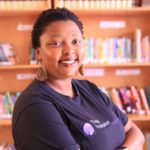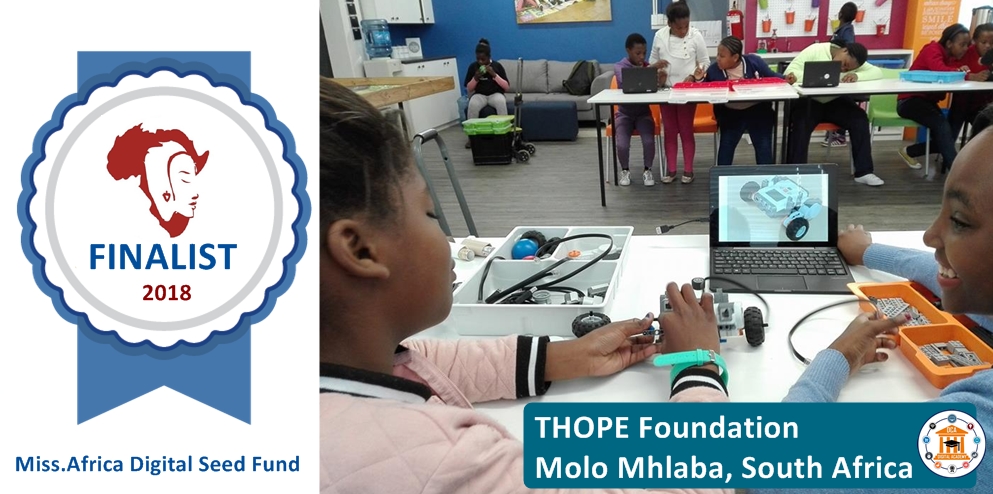Molo Mhlaba Schools, South Africa is a finalist for the 2018 Miss.Africa Seed Fund
In our interview today Ms. Rethabile Sonibare, the Founder Thope Foundation which runs the Molo Mhlaba Schools is a pan-African network of low fee private schools for girls speaks Miss.Africa Digital Program.
Can you tell us about this project that has applied for the 2018 Miss.Africa Seed Fund Awards?
Molo Mhlaba Schools is a pan-African network of low fee private schools for girls living in underserved communities. We believe that all girls living in poor communities deserve safe, affordable, quality education in their communities. We offer high quality inquiry project based Montessori curriculum combined with robotics and computer science to enable girls in poor communities to join the fourth industrial revolution in a schooling environment preparing them for jobs of the future. Molo Mhlaba aims to be a network of iSTEAM (Innovation in Science, Technology, Engineering, Arts and Maths) schools, each educating girls from pre-primary to primary school. The longer-term plan is to grow to a network of 10 schools nationally in the next decade, with an annual intake of 60 girls in each institute, starting from 2018, ultimately reaching 420 learners per campus per annum in 2028. The first campus opened its doors in Khayelitsha on 17 January 2018. It is based in Masibambane Hall which is a strategic point with access to the Harare library in Khayelitsha and easily accessible for prospective parents from Harare, Ilitha Park and Monwabisi Park.
What are some of the challenges you are trying to address with your project?
South Africa has a two-tiered education system – one for the rich and one for the poor. The majority of poor children experience very low quality of education as a result government’s no fee-paying schools have become synonymous with poor quality education.
Elite families buy quality education in the country’s most expensive schools, thus reproducing inequality and widening the gap between the poor and the rich. Molo Mhlaba private independent schools provide quality education for the most marginalised and disadvantaged children. This requires working beyond the CAPS curriculum, creating conducive teaching and learning environments, using relevant languages for teaching and learning, thus treating both the children, teachers and parents with dignity while also bringing justice in education in our lifetime. Unlike elite private and state schools in the country, our schools charge fees lower than the combined school fees, transport fare and aftercare fees at the cheapest state schools in quintile two. Thus, our private schooling refers to curriculum, pedagogy, materials and quality teaching rather than the amount paid to attend the school.
Molo Mhlaba Schools have to charge fees in order to pay the costs of running an independent school, which include teacher salaries, administration costs, rent and school maintenance. We also believe that by allowing parents to contribute something towards their children’s education we build a sense of ownership and responsibility on their side. However, the majority of children who cannot pay fees are not excluded from registering at Molo Mhlaba Schools and we put huge effort on creating a bursary fund for most of these children, while we also encourage well to do South Africans to pay it forward by adopting a child and paying for their education.
How are you bringing innovative approaches to these problems?
The Molo Mhlaba education model uniquely seeks to develop a safe space for girls to learn, grow, and thrive by ensuring that a holistic approach to their development is taken. We do this through:
- Multilingual learning: a multilingual teaching and learning environment to prepare the girls for a global world.
- Smaller classrooms: by having smaller classroom sizes we are able to support and cater for the varied interests of learners.
- Nutritious meals: our school provides two warm nutritious meals for healthy bodies and minds.
- Extended school day: an extended school day ensures that learners are kept safe while parents are away, and allows us to create meaningful experiential after school care programmes. During the 9 ½ day, we are able to ensure that project based experiential learning is achieved through robotics, computer programming and science are included in the school day.
- Teacher development: in order to attract the kind of teachers who can adapt to our school and its demands, we will be exploring a model that attracts students in teacher education and creating a fund to support their Montessori Training with partner institutions in Cape Town. Our ultimate vision for this training is to develop the Molo Mhlaba Fellowship which will empower educators to adopt an inquiry based project style in delivering iSTEAM education for children who might otherwise be left behind by the digital divide.
- Home-School Partnership: Our vision is to build a strong relationship with parents so as to help them support their children’s learning at home and participate in school activities.
How does it feel to gain international recognition for your work?
We are incredibly privileged and honored to be provided an international platform upon which to share our work and mission. This opportunity will provide much needed exposure and opportunities to link in with developments in Africa on women and girls in the digital economy but also extend our brand beyond the South African borders. We hope that this exposure be result in resource mobilization to achieve our ambitious growth targets.
Can you explain why skills for women in tech is so important?
Children can’t dream of a career they have never heard of. Under-served communities in South Africa, due to the failure of institutions to provide adequate access to educational and economic opportunities, are almost entirely employed in low-skilled sectors. New generations of South Africans in these communities grow up never knowing that STEM could have been an option for them, being able neither to develop the skills required to pursue a career in these fields nor to demonstrate their full potential. As a child from these communities, your odds of pursuing a career in STEM are even lower if you are a girl.
Young girls growing-up in these communities find themselves at great risk of physical and sexual violence, bullying, teenage pregnancy, drug and alcohol abuse, and gang culture. They constitute the majority of the 50% drop-out rate amongst students between Grade 6 and 9. For the girls that do stay in
school, they continue to be barred from learning because they do not feel safe. Their odds of pursuing a career in STEM are further reduced by deeply ingrained gender norms, and by a lack of female scientist role models that could help them envision and understand how to pursue a career in science.
Molo Mhlaba has a radically different vision for what these girls’ expectations in life should be. It strongly believes there is no reason these girls shouldn’t be inspired to dream about a career in STEAM, and that they have a right to be given a safe, enjoyable and supportive environment in which to work hard towards achieving their goals.
By providing early exposure and access to technology, Molo Mhlaba bridges the economic and tech divide that girls in poor communities do not have access to. This access improves the opportunities they are able to access, access to life saving information that would not otherwise be there as well as marketable skills to enter the labour market.
What in your opinion should be done to address the digital skills gap in Africa?
In my opinion, the acquisition of digital skills is the first and most fundamental part of addressing the gap. Poor communities need to be education by the various levels of government to ensure more uptake and then providing wide spread access. Thirdly, the digital skills have primarily focused on computers and access to the internet, however, the cellphone revolution provides greater opportunity to teach and education people about digital skills.
Click to watch on Dotafrica.Tv

Ms. Rethabile Sonibare, Thope Foundation, South Africa.
Ms. Sonibare, is the Founder Thope Foundation which runs the Molo Mhlaba Schools Network.
We believe that all girls living in poor communities deserve safe, affordable, quality education in their communities. Molo Mhlaba aims to be a network of iSTEAM (Innovation in Science, Technology, Engineering, Arts and Maths) schools, each educating girls from pre-primary to primary school
